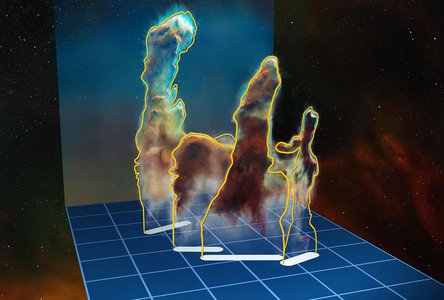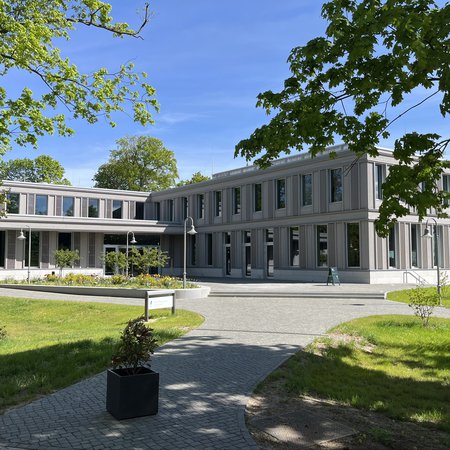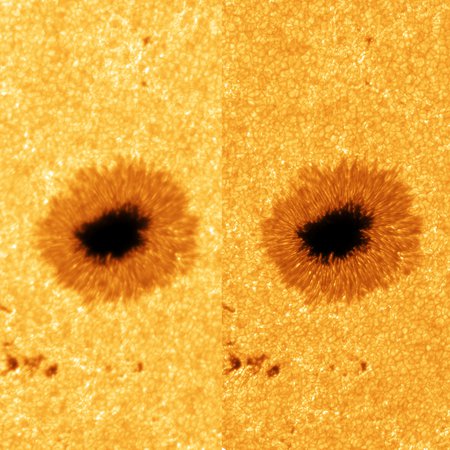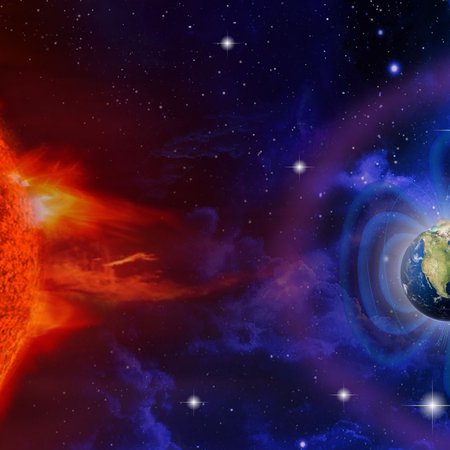New AIP research project on human-machine interaction
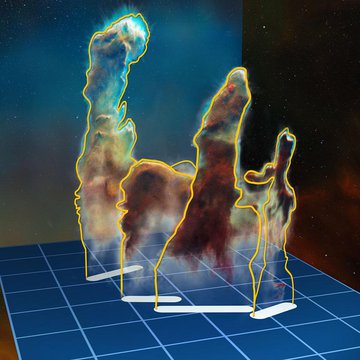
Three-dimensional measurement of astronomical objects by multimodal imaging done with the 3D multi-channel spectrograph MUSE, which was co-developed by AIP.
Credit: ESOThe Leibniz Institute for Astrophysics Potsdam (AIP) has successfully raised funding for a new project as part of the funding scheme "Zwanzig20" (Federal Ministry of Education and Research). The aim of the one-year research project "4D high throughput spectroscopy" (4D HTS) within the Innovation Alliance 3Dsensation is a significant improvement of the processing of large data volumes.
Through the analysis of the process chain "image acquisition - image processing - visualization", real-time requirements of spectroscopic technology in the fields of production, mobility, health and safety shall be examined.
A 3D imaging spectrograph, re-designed by AIP from the MUSE instrument deployed at ESO, is used as a reference system for imaging Raman spectroscopy. This exemplary case study shall provide information on the rate-limiting factors of currently available technologies. 3D spectroscopy as an example of multimodal 3D imaging is particularly suitable for this purpose, since its extremely high data rates in all areas of the process chain reach the performance limits of available technologies.
4D HTS will deliver basic insights on these issues. Additionally, it will show vulnerabilities and needs for further research and technology development. Recommendations for future R & D projects in the field of multimodal 3D real-time imaging can be derived. In addition, the cross innovation potential of the already highly developed expertise in the field of multimodal imaging in astrophysics shall be determinded by 3Dsensation. This includes powerful technologies for archiving complex data processing and pattern recognition as well as for linking metadata.
The Center for Innovation Competence innoFSPEC Potsdam is affiliated with the Leibniz Institute for Astrophysics Potsdam (AIP). innoFSPEC Potsdam is a founding member of 3Dsensation and actively participated in the establishment and development of the initial consortium. The AIP is one of the world’s leading institutions in the development and use of multi-dimensional imaging spectroscopy for observing objects in space and now offers this expertise to 3Dsensation. This shall strengthen knowledge and technology transfer in the State of Brandenburg, and science and research in Potsdam. 4D HTS was granted in connection with five basic projects that are of central importance to the continuing work of 3Dsensation. The selection of projects is based on their cross-sectoral relevance, high synergy potential, technical and methodological challenges and economic importance.
Scientific Contact: Prof. Dr. Martin M. Roth, +49 331-7499 313 mmroth@aip.de
Press Contact: Kerstin Mork, +49 331-7499 803 presse@aip.de
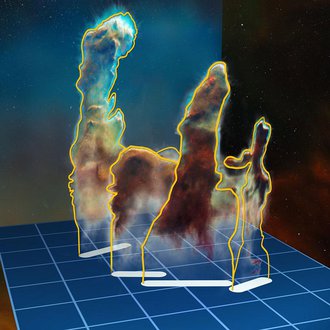
Three-dimensional measurement of astronomical objects by multimodal imaging done with the 3D multi-channel spectrograph MUSE, which was co-developed by AIP.
Credit: ESOThe Leibniz Institute for Astrophysics Potsdam (AIP) has successfully raised funding for a new project as part of the funding scheme "Zwanzig20" (Federal Ministry of Education and Research). The aim of the one-year research project "4D high throughput spectroscopy" (4D HTS) within the Innovation Alliance 3Dsensation is a significant improvement of the processing of large data volumes.
Through the analysis of the process chain "image acquisition - image processing - visualization", real-time requirements of spectroscopic technology in the fields of production, mobility, health and safety shall be examined.
A 3D imaging spectrograph, re-designed by AIP from the MUSE instrument deployed at ESO, is used as a reference system for imaging Raman spectroscopy. This exemplary case study shall provide information on the rate-limiting factors of currently available technologies. 3D spectroscopy as an example of multimodal 3D imaging is particularly suitable for this purpose, since its extremely high data rates in all areas of the process chain reach the performance limits of available technologies.
4D HTS will deliver basic insights on these issues. Additionally, it will show vulnerabilities and needs for further research and technology development. Recommendations for future R & D projects in the field of multimodal 3D real-time imaging can be derived. In addition, the cross innovation potential of the already highly developed expertise in the field of multimodal imaging in astrophysics shall be determinded by 3Dsensation. This includes powerful technologies for archiving complex data processing and pattern recognition as well as for linking metadata.
The Center for Innovation Competence innoFSPEC Potsdam is affiliated with the Leibniz Institute for Astrophysics Potsdam (AIP). innoFSPEC Potsdam is a founding member of 3Dsensation and actively participated in the establishment and development of the initial consortium. The AIP is one of the world’s leading institutions in the development and use of multi-dimensional imaging spectroscopy for observing objects in space and now offers this expertise to 3Dsensation. This shall strengthen knowledge and technology transfer in the State of Brandenburg, and science and research in Potsdam. 4D HTS was granted in connection with five basic projects that are of central importance to the continuing work of 3Dsensation. The selection of projects is based on their cross-sectoral relevance, high synergy potential, technical and methodological challenges and economic importance.
Scientific Contact: Prof. Dr. Martin M. Roth, +49 331-7499 313 mmroth@aip.de
Press Contact: Kerstin Mork, +49 331-7499 803 presse@aip.de
Images
Three-dimensional measurement of astronomical objects by multimodal imaging done with the 3D multi-channel spectrograph MUSE, which was co-developed by AIP.
Big screen size [1000 x 675, 110 KB]
Original size [1280 x 864, 140 KB]
